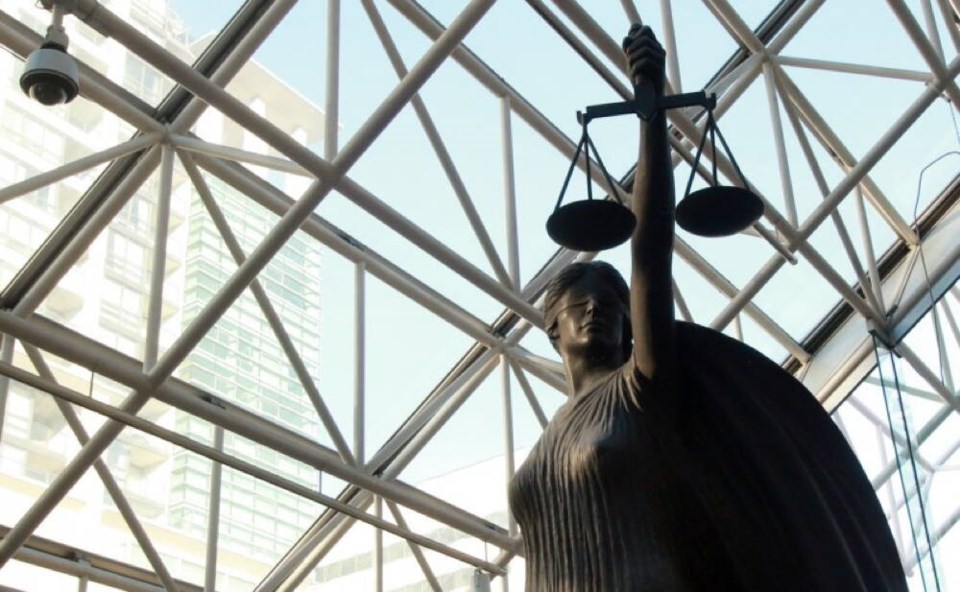VANCOUVER — The provincial government will be in B.C. Supreme Court on Tuesday for two days to face allegations from environmental groups that it has failed to provide an adequate plan to meet greenhouse-gas emission targets to fight climate change.
The lawsuit, filed by Ecojustice on behalf of the Sierra Club B.C. in March, alleges the government’s plan falls woefully short by failing to include a plan for the 2025, 2040 and 2050 climate targets, and leaves out details on how it plans to cut carbon gases from the oil-and-gas sector.
The Sierra Club contends that the failure to do so has left industry and the public in the dark about whether B.C. is on-track to achieve its emissions targets.
The first target — 2025 — is three years away and requires a reduction of 16 per cent below 2007 emissions levels. However, the latest data from the government show that in 2020, B.C. only reached a one per cent reduction below 2007 levels. If carbon offsets from forest management projects are included, that figure increases to three per cent.
Experts told Postmedia News that to meet targets it needs to cap natural gas emissions and reduce methane emissions. Oil-and-gas production and transmission are the second-largest sources of greenhouse gases in the province, after trucking and rail transportation.
The Sierra Club alleges the accountability in the Climate Change Accountability Act is missing and that the province needs to include implications of expanding natural gas extraction and liquefied natural gas (LNG) facilities, which are long-term sources of emissions.
“We are experiencing more extreme and escalating climate impacts around the world like the hurricane in Florida, ongoing heat waves in China, and it shows that we are running out of time to acknowledge and address the gaps in our climate action plans,” said Jens Wieting, a senior climate campaigner with the Sierra Club on Saturday.
“Evidence shows that we need to stop building new fossil fuel projects to meet our climate targets. So, the question for the B.C. government now is what level of leadership can we expect to ensure that we don’t start any new (fossil fuel) projects that make it impossible to meet those targets?”
He also questioned how B.C. can ever meet its climate targets while still green-lighting new LNG projects.
Asked for comment ahead of the court case Tuesday, a spokesperson for B.C.’s Environment Ministry referred Postmedia to its earlier statement regarding the case. In May, the B.C. government filed a response to the suit, saying the case should be thrown out. It argued the issues raised by the Sierra Club amount to a difference of opinion and aren’t matters that belong in the courts.
The government contends that Sierra Club’s complaint is that plans are just not to “Sierra Club’s liking,” particularly with respect to the oil-and-gas sector targets.
While the report doesn’t contain chapters dedicated to quantifying progress to either the 2025, 2040 or 2050 targets, its supporting material is “replete with information” about how the various steps described in the report will achieve increasing reductions over time, the government argued in its response to the suit.
In an emailed statement, the government said “B.C. has the strongest climate accountability measures in Canada, ensuring credibility and transparency,” and that any future government is legally bound to publicly report on progress in achieving climate targets.
Wieting argued that the government can do better in terms of accountability and transparency.
“The clock is ticking for climate change,” he said. “The government must demonstrate that we can meet our targets because there’s no room for error. Globally we see that we are crossing all those red lines. We already see catastrophic impacts across the world … acting now is extremely important to avoid even worse climate disasters in coming years.”
The Climate Change Accountability Act requires the government to publish annual reports on how it plans to make progress toward its climate targets. B.C.’s targets are for provincewide emissions to be at least 40 per cent less than 2007 levels by 2030, at least 60 per cent less by 2040 and 80 per cent less by 2050.
Emissions from transportation, which is the largest greenhouse source in the province, fell in 2020 for the first time since 2011. However, they were still 10 per cent higher in 2020 than in 2007, the baseline the province used to set targets.
— With files from Nathan Griffiths



